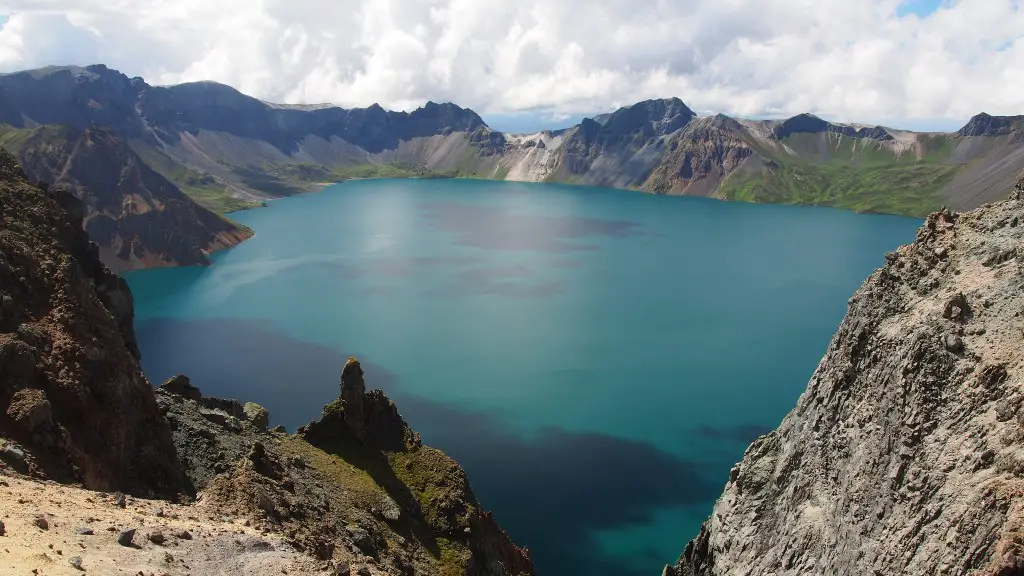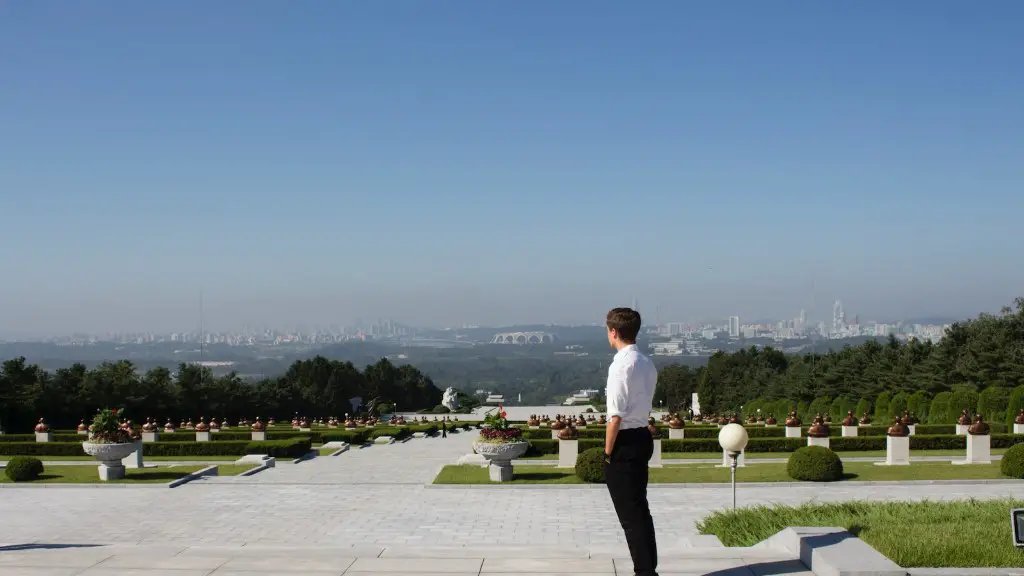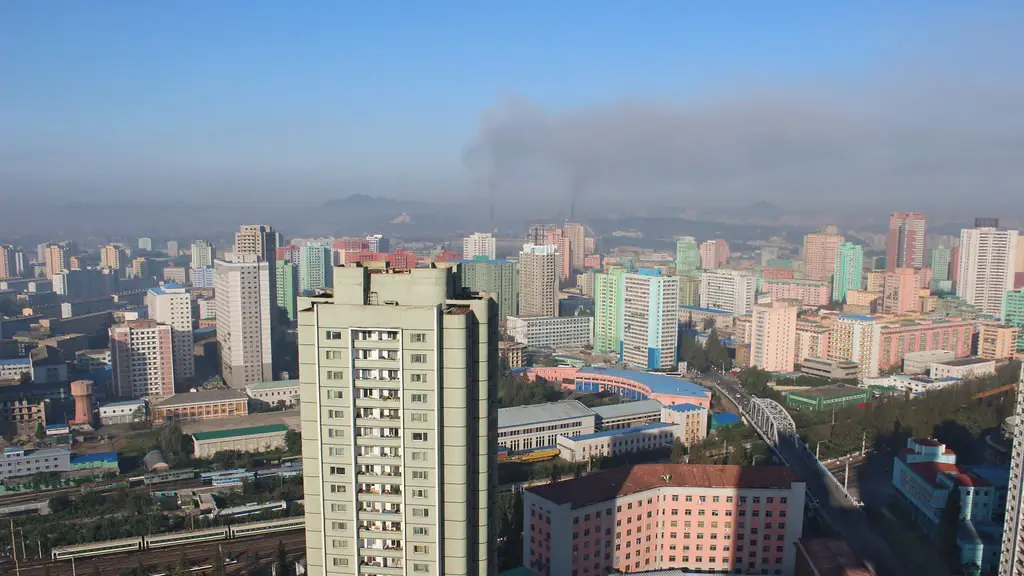The Countryside
North Korea is a relatively small nation with a population of approximately 25 million people and an area that is only slightly over 120,000 square kilometres. Despite this, North Korea is often portrayed as one of the most isolated nations in the world. This image is largely false, as the country does not live in total darkness; it is not a hermit state.
One of the most interesting aspects of North Korea is the stunning countryside. Although much of the countryside remains undeveloped, nature has created a beautiful landscape. The mix of rolling hills, rivers, and luscious grasslands provide a stunning view. As soon as you enter North Korea, you feel like you’re in a different world.
However, the blessings of nature are only half of the story. Everything is heavily monitored by the government to ensure it stays that way. People living in the countryside are subject to detailed scrutiny, which serves as a reminder of the oppressive state.
Cities
In stark contrast to the countryside, many of North Korea’s cities are heavily industrialized. Pyongyang, the capital, is where the government headquarters are located and is the most modern city in North Korea. It houses thousands of citizens and is an example of the government’s industrialization of the country.
Pyongyang is often described as the showpiece of North Korea. It is full of museums, schools, parks, and public sculptures to create an image of the perfect country. Despite the fact that the citizens of North Korea may not receive the same luxuries as other nations, the city still provides the illusion of prosperity.
However, take away the façade and a different picture starts to emerge. Pyongyang is often a cold and lifeless place. Citizens of the city live in fear of the government, as they know they can never voice their true feelings without plenty of repercussions.
The Economy
On top of its isolation and oppressive governance, North Korea is in a vicious cycle of economic instability. The current economic situation has been going on for decades.
A major factor in the crumbling economic situation is the sanctions imposed by foreign powers. These restrictions have hit the nation hard and have crippled its industries. As a result, many citizens live at or below the poverty line, leading to an alarming number of homeless people in the country.
Without the help of foreign aid and relief, North Korea could face a serious humanitarian crisis that has already begun to spread throughout the country. Relief from the international community is what is needed to give the nation a fighting chance.
Politics
The politics of North Korea are ruled by one party; the dictatorial government headed by the Kim family. Whilst there is an element of elections and parties, the political landscape is incredibly one sided. There is a distinct lack of freedom and civil liberties, with free speech being heavily restricted.
Countless resources are allocated to the military and defense industry, with the government focusing more on defending the nation rather than improving it. Human rights abuses are rife in North Korea and citizens are often unheard and unrepresented in the face of heinous acts.
The citizens of North Korea have no real say in the government and have no option but to go along with whatever the government demands of them. Whilst the international community has attempted to intervene, it is ultimately impossible to effect real change without widespread support from the population.
The Culture
North Korea is full of many wonders, with a unique culture that has been preserved for centuries. Despite the fact that western culture has become incredibly influential all around the world, North Koreans are still able to keep much of their traditional values and beliefs alive.
Within North Korea, music and art are seen as forms of resistance and defiance towards the government. Musicians, particularly those from the younger generation, often draw inspiration from western music to create new and unique styles. Much of the art depicts strong feelings and emotion towards the government, often hinting at the dissatisfaction that many citizens have with the way the country is being run.
At the same time, there is a great deal of pride that many North Koreans feel for their country. Despite the fact that the country can be incredibly oppressive, North Koreans are able to find hope and positivity in their culture and heritage.
Education
Despite the international sanctions and oppressive government, North Korea still manages to provide its citizens with a basic standard of education. Schools are government-run, but much of the teaching is done through books, pamphlets, and lectures. The school year is board-based, with exams taken at the end of every term.
Whilst these educational opportunities are certainly valuable, North Koreans are often not exposed to much beyond their state-approved curriculum. This means that many citizens are unaware of the events happening in the wider world and the immense liberties that citizens of other nations have.
The government has a tight grip on the education system and often combines facts with propaganda and messages that are supportive of the government’s agenda. This not only gives children a one-sided view of the world, but also creates an environment in which the citizens view their own country as the best in the world despite the enormous amount of issues they face.
Healthcare
The healthcare system in North Korea is struggling to meet the demands of its citizens. This is due to a mix of factors, including the lack of resources, healthcare infrastructure and insufficient international aid.
Due to the fact that many North Koreans live in poverty, access to healthcare is incredibly limited. Medical facilities are relatively well-equipped, but due to the lack of proper sanitation and sanitation supplies, many health problems are often neglected or not noticed. This leads to persistent health issues.
The government has placed a strong emphasis on preventative care and health education in order to tackle the medical issues that the nation faces. Although this has been successful to an extent, there is still much to be done in order to guarantee a better quality of life for North Koreans.
Technology and Communication
Despite the fact that the nation is heavily sanctioned and punished due to the oppressive regime, North Korea is surprisingly advanced in terms of its technological abilities. Whilst citizens do not have access to all the same services and products as the rest of the world, they still have access to some innovative technology.
The internet remains heavily censored and monitored by the state, although access is increasing. Smartphones are also becoming increasingly popular, as well as televisions, radios, and computers.
Communication between citizens of North Korea and those in other countries is heavily restricted. Despite this, however, many North Koreans are able to use technology to communicate with those outside of their country. This is a remarkable feat, considering the circumstances.
Religion
Religion in North Korea is frowned upon and heavily restricted by the government. The state promotes an atheistic ideology and has condemned religion for as long as it has been in power. The most widely practiced religion in North Korea is Buddhism, although other religions such as Christianity continue to be practiced in secret.
For citizens of North Korea, religion is seen as a danger to the government and is therefore discouraged. This has meant that many North Koreans are unable to practice their faith and have no access to religious services. As a result, many have chosen to turn away from their faith as they fear the consequences of openly expressing their religious beliefs.
Despite this, religion still plays an important role in North Korea and many religions are quietly practiced in the country. Fortunately, some positive steps have been taken in recent years to guarantee a modicum of religious freedom, although this is far from perfect.


